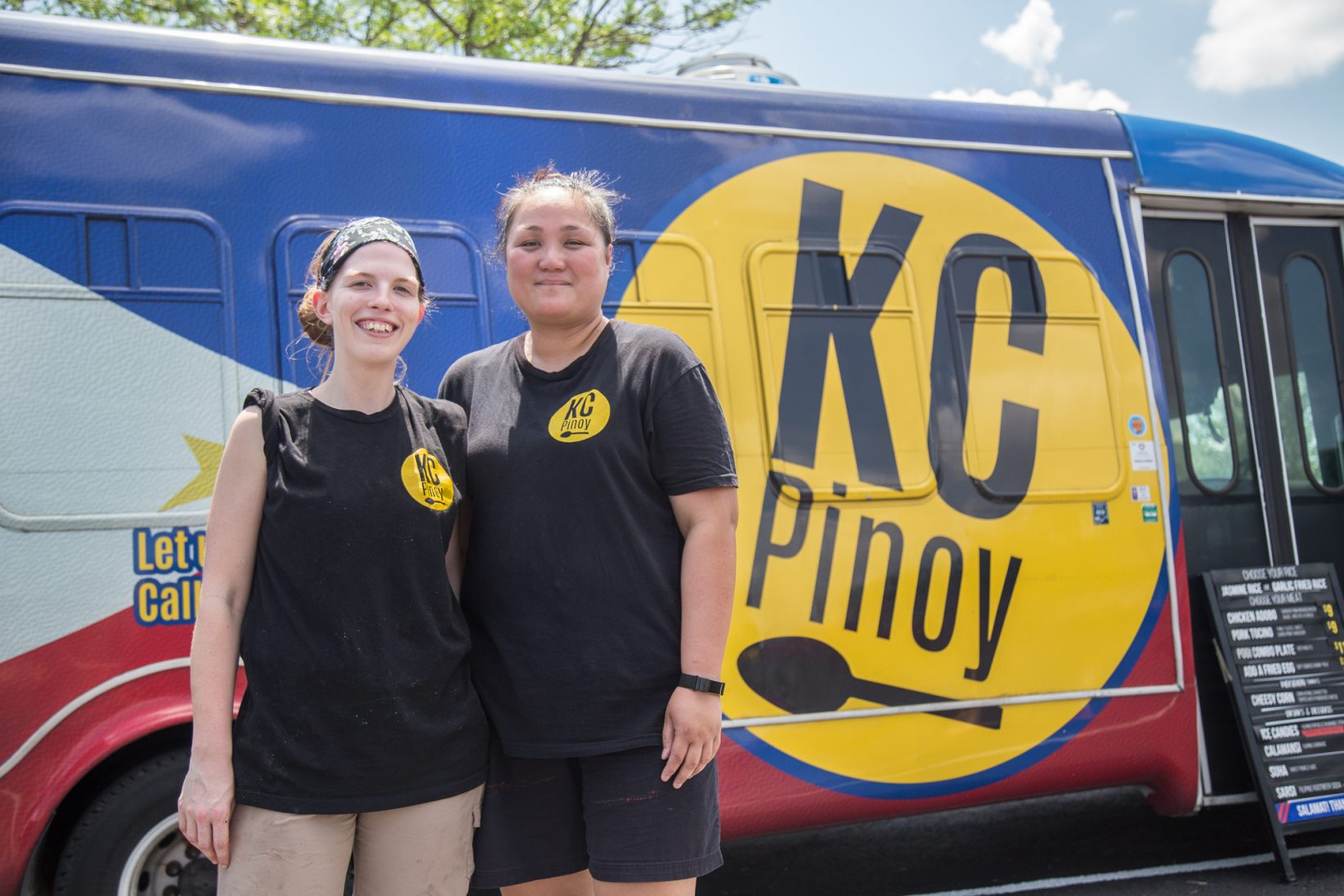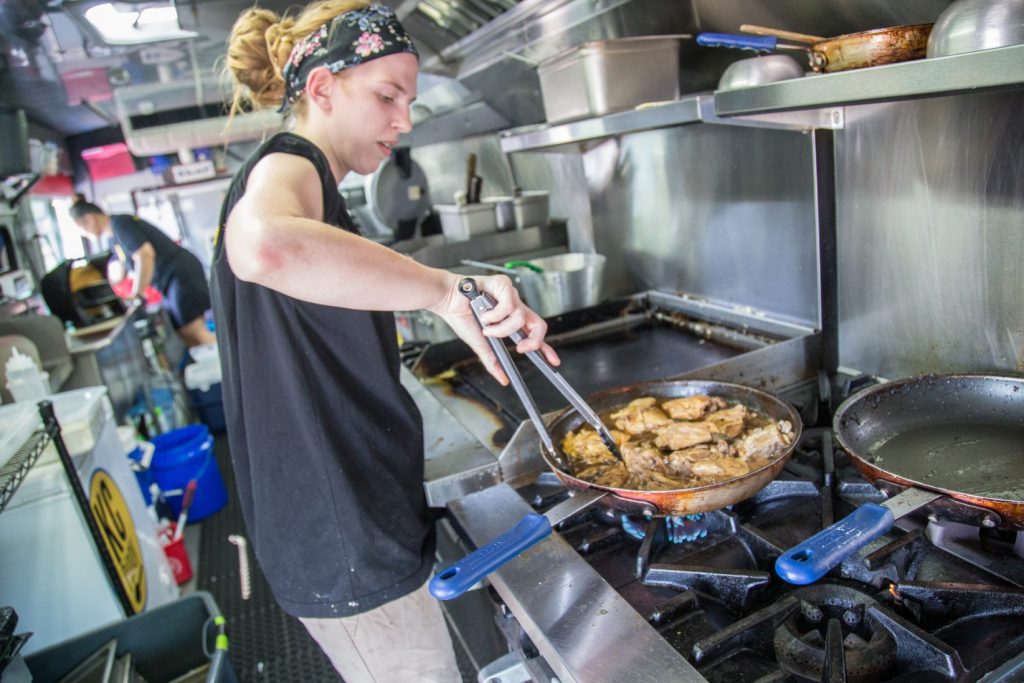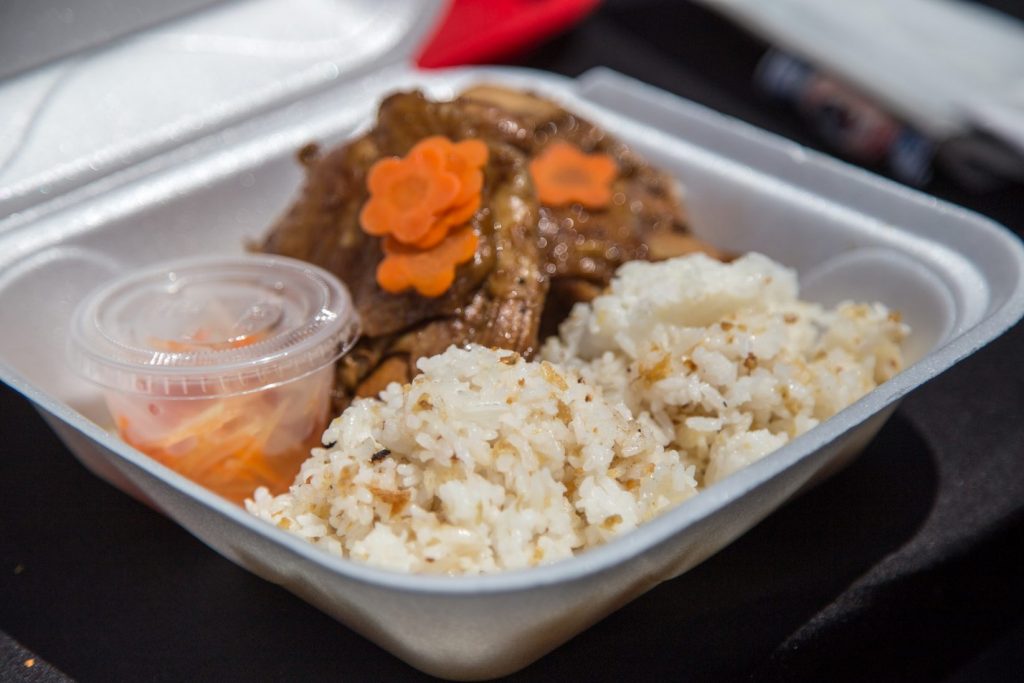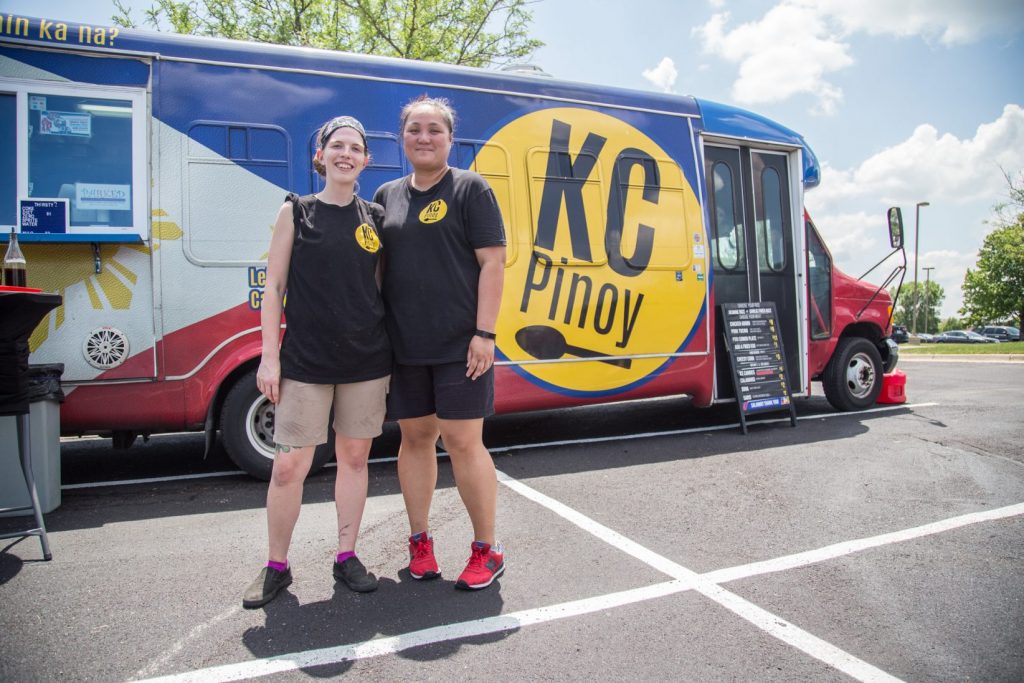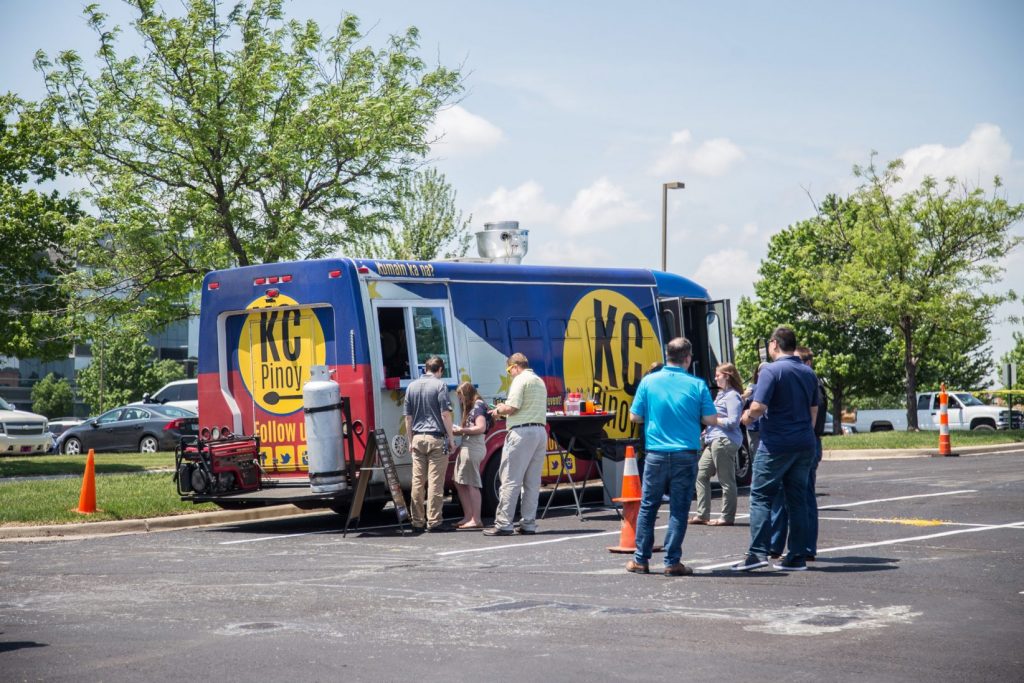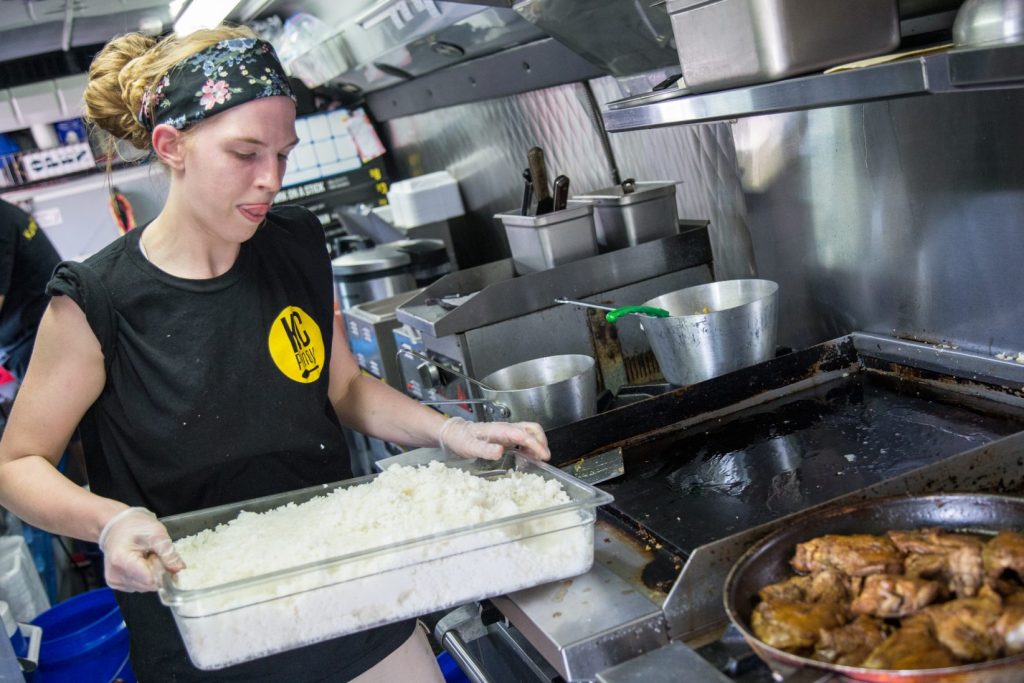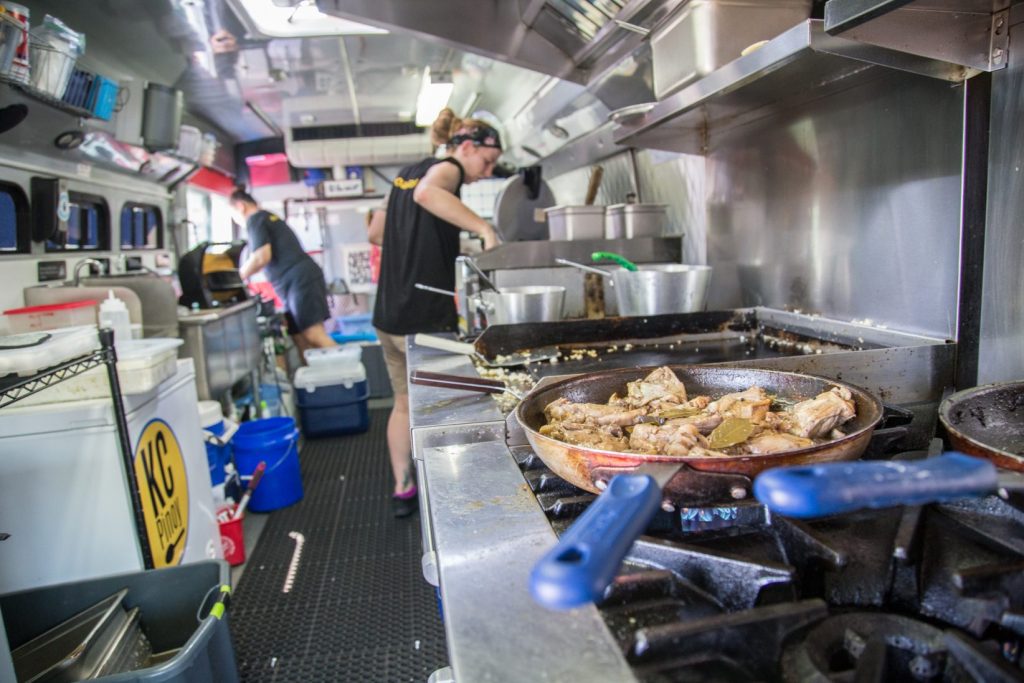Editor’s note: The following content about Chrissy Nucum’s KC Pinoy is sponsored by Mid-Continent Public Library but independently produced by Startland News.
KC Pinoy food truck’s last customer of the day was aptly named: Lucky.
“We’ve had a good enough day to break a hundred [dollar bill],” owner Chrissy Nucum told the diner at the end of her lunch rush in a hot corporate parking lot in Overland Park.
More hungry would-be customers trailed Lucky outside the food truck, drawn in by the scents and reputation of Nucum’s Filipino fare. But the combo plate served up — chicken adobo and pork tocino topped with a soft-cooked, runny yolk fried egg — signified the final servings prepared for the sweltering afternoon.
“We just ran out of food. Sorry,” Nucum called out the window of the converted Kansas City Area Transportation Authority shuttle. “Yes, that is good — just not good for you.”
It was the planned outcome for the day: Feed 50 to 60 diners without leaving any of the food truck’s offerings to waste at the end of the rush.
Such precisely timed coordination has developed for Nucum since launching KC Pinoy in 2015, she said. An opening weekend during a First Friday in the West Bottoms showed the importance of getting her “food math” correct.
“We officially got killed on that one. We had a line two blocks long. They all showed up. We ran out of rice,” Nucum said. “For an Asian food truck, that’s really bad.”
Keep reading after the video.
A formula for success
Today, KC Pinoy can be found visiting sites across the metro, having expanded from festival-style atmospheres in KCMO to include weekdays and events in Johnson County cities and North Kansas City, she said.
It’s a far cry from Nucum’s former career in internet security sales, she said. Though she comes from a family of cooks, as well as a region in the Philippines known for its flavorful dishes, Nucum hopped in the food truck business following inspiration from a reality TV competition featuring the wheeled-eateries.
“After a couple glasses of wine and two hours on YouTube, I decided to do a little more research on Kansas City’s food truck scene — how to license, how many trucks are out there, what kind of demand is there for food trucks?” she said.
Resources at Mid-Continent Public Library and the University of Missouri-Kansas City proved not only valuable in learning about the market specifically, but also running a small business in general, Nucum said.
One of her instructors at MCPL, Jay Runnfeldt, a restaurant consultant with JCB Projects, emphasized the need for radical candor in dealing with early stage food concepts, he said. Developing restaurateurs often need to be told to close their doors — or never open them at all, said Runnfeldt, a more than 25-year veteran of the industry.
“This is somewhat a science and somewhat a guess. There’s a reason why nine out of 10 restaurants fail, and it goes back to not managing correctly — watching food costs, labor costs, menu costs,” he said. “And then there’s ownership. A lot of owners out there are not hands-on enough, and they’re putting too much responsibility on people they’re paying, and those people don’t necessarily treat it like it’s theirs.”
Keeping afloat in the competitive industry boils down to daily operations and maintaining a keen eye on the numbers, Runnfeldt said.
“It’s exciting for me to show people percentages, and say, for example, ‘You’re at 35 percent in your labor and you should be at 27 percent, which is the national standard.’ Then you show them how they can get to that,” he said. “Just cutting 15 minutes here or there can be big. People don’t realize this is a nickel-and-dime business.”
That food math correlates to more than just timing meal preparations and managing ingredients, Runnfeldt added.
“If you give a kitchen 100 towels, they’ll use them all. If you give 1,000 towels, they’ll use them all. What’s going to cost you more in the end?” he asked. “Well, let’s find a happy medium and maybe we can save 50 bucks a week. That’s just one bill, but if you can do that 25 times a week, 52 weeks a year, that’s a lot of money.”
Runnfeldt began his first class for MCPL with the basics: a list of the top 10 things needed for starting a restaurant, he said. Conversation quickly turned to food trucks — a dicey topic for the experienced Runnfeldt who previously owned dive bars, high-end nightclubs, contemporary American restaurants, taverns and culinary cocktail lounges in Chicago, Milwaukee and Charlotte before turning to consultancy.
“The failure rate for food trucks is even worse than nine out of 10,” he said. “I asked [MCPL], ‘Do you tell people they most likely are going to fail?’ And they said, ‘Yes.’ But their response, which I really liked was, ‘They’re going to try anyway — We’d rather give them the resources to succeed than just wish them good luck.’”
A taste of entrepreneurism
Accepting the significant risk of investing in her dream, Nucum drew strength from her heritage, she said.
“I started out not really wanting to be an entrepreneur, but I did want to cook,” she said. “My passion is cooking for people. And although I didn’t have any formal training in the kitchens, or have worked on any kitchens, I knew that there was a need and a niche for Filipino food in Kansas City.”
Ice candies — flavored popsicles in mango, strawberry, grape and orange — offered on her truck harken back to Nucum’s childhood in the Philippines, she said. There she sold the treats from a lemonade stand-type setup for extra money on top of her allowance, she said.
“Filipinos have always been an entrepreneurial kind of people,” Nucum said, laughing.
KC Pinoy was self-funded, Nucum said, but its success so far wouldn’t have been possible without the guidance and mentorship of peers in the industry, as well as veterans like Runnfeldt.
“The first thing I did when I decided to start this was I talked to a lot of current food truck owners to see if they wouldn’t mind me hanging around, asking some questions, maybe working the line,” she said. “Surround yourself with people who have done it before because they will be more than happy to show you or tell you what mistakes they’ve made so that you don’t have to do it on your end.”
Organizations like KC BizCare and AltCap also are there for entrepreneurs trying to find their way through the early stages of business, she said. Nucum hopes to eventually open a brick-and-mortar location — a transition Runnfeldt cautioned could be more challenging than most would imagine.
Still, she believes it’s worth striking while the stovetop is hot, she said.
“It’s hard. … It’s very hard,” Nucum said from the back of her food truck, fanning herself amid the sweltering heat from outside and the nearby cooktops. “I’m not usually a cheesy person, but at the end of the day, I come home and I’ve shared a piece of my family, my culture with a lot of people who I wouldn’t [have met] if I was sitting in a cubicle.”




